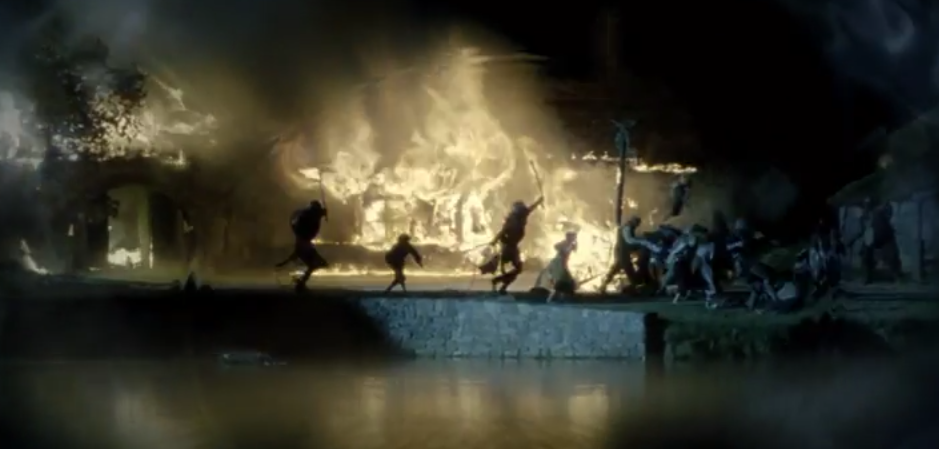Tolkien Tuesday: Writing Plot Consequences and the Scouring of the Shire
“I throw Billy into the mouth of the shark!”
That’s a quote from one of my latest D&D sessions.
Do I tell you this to brag about how insane my players are, causing completely unforeseeable events?
Well, yes and no. (Although D&D can make you a better writer.)
You see someone getting thrown at a shark and begin to wonder.
What happens next?
How will Billy react?
Will this actually help the “heroes” stop a giant shark attacking their ship?
Does Billy have any family that won’t appreciate him being creatively used as a weapon?
Will the players’ characters begin to regret what they have done? (Spoiler alert: no.)
We believe in you Billy!
When something happens in a story (cause), it leads to many possibilities (effect). Those effects make up the tension building in a story. They are the consequences the characters have to deal with.
Consequences.
What a terrible word.
And it has negative connotations.
It’s not like we say, “Well, getting a million dollars is just the consequence of your actions, Ted.”
But that’s all it is. It’s the effect of the cause.
Since it plays such a significant role in our life, it should play in our fiction too. This terrible word, consequences, gives us the freedom to terrorize our characters. That’s where the story starts happening.
The inciting incident leads to complications that leads to a climax that leads to a resolution. Each plot point is just a consequence of the one that came before.
And if you want to really keep your readers’ on their toes, your character’s good actions should have consequences just as much as their bad ones.
Let’s get geeky to look at how to do that.
Consequences for Characters in The Lord of the Rings
A funny thing happens if you decide to read The Lord of the Rings after watching the movies. The Ring gets destroyed, peace returns to Middle Earth, and hope for the next age of the world is kindled in the hearts of good people.
Or something.
But then you realize you have multiple chapters left. The hell? The Ring is destroyed so...like...go home?
And that’s just what the characters do. The four Hobbits, Frodo, Sam, Pippin, and Merry, have the longest trek back, and when they get home, it’s not the same as they left it.
As it turns out, the world still goes on, even if you’re out fighting Dark Lords and giant spiders. (‘I could handle the Dark Lord, but you’re on your own with the spider, Mr. Frodo’–me as Sam.)
The Shire is safe, pristine, and something the Hobbits can rely on to be a sanctuary. But they have made enemies along the way. It’s not like they were being dicks to people, but if you ruin the plans of a pissed-off wizard, he’s not going to just let that go.
So the Hobbits return to the Shire, and it’s a mess. It’s a foreign world. And as we read, we feel the sting of it too.
There’s billowing smoke from the wheels of industry and evil men that have changed how everything is done in the Shire.
And the Party Tree is chopped down. THE PARTY TREE, THOSE BASTARDS!
Wait…this doesn’t look anything like it did on that travel blog!
The Hobbits are trapped in their own land, ruled by people that decided it was theirs now.
And they just kind of...let it happen. But what can you do? Hobbits are not known for their military prowess, even if they did invent the game of golf by knocking off a goblin’s head once.
Why would Tolkien throw this into the very end of his series? We’ve been through a ton of narrative just to see the home of the most innocent heroes completely upside down.
It’s because Tolkien knew the importance of consequences. He knew that the world doesn’t stay the same after conflict, even if that conflict is just.
Tolkien went off to WWI to return to a home that was utterly changed by the need to industrialize. He knew the sting of not recognizing your home after fighting so hard for it. And this was such a powerful feeling he knew that’s how he needed to end The Lord of the Rings.
And in this story, it does a few things.
First, it shows us that just because the Ring is destroyed doesn’t mean bad stuff is never going to happen again. People are still people, and Men are some of the worst kinds of those people. And guess what? Middle Earth is entering the Age of Men.
Second, it shows that there are consequences even to good deeds.
Saruman was obviously a problem. He rose an army of Uruks and tried to take control of Rohan by force. He wanted power for himself and used his abilities for selfish ends.
And he, the head of the Five Wizards and one of the most powerful beings in Middle Earth, was taken down by two Hobbits that talked to some trees.
Yeah, where were you for the Party Tree, pal?
So Saruman decides to use the power of his voice and convince some evil Men to take over the Shire. He has them cut trees, destroy buildings to make way for mills and factories, and imprison any Hobbit that says nay.
It’s a world now run by greed and exploitation. And I’m sure Tolkien wasn’t making any statement here, nope...not a one.
But this proves just how far Saruman has fallen. Remember, he was sent to Middle Earth by the forces of good to do good things. See what happens when you lie on your resume?
Saruman brings the Shire to this state out of petty revenge. When finally confronted by the Hobbits, he goes as far as to say:
“I have already done much that you will find it hard to mend or undo in your lives. And it will be pleasant to think of that, and set it against my injuries.”
He revels in the simple fact that the Shire is scarred for the ones that fought for it.
A good deed to take down Saruman is rewarded with the destruction of the peaceful sanctuary of their home.
But that’s not the only consequence here.
Tolkien reveals just how changed the four Hobbits are. He shows that they can rise to the occasion, and the changing world is in the good hands of those who earned peace.
They rally the rest of the Hobbits to action. Merry especially proves that he can lead a military force, and Sam looks like some heroic soldier as he calls upon the aid of other Hobbits. No wonder Rosie marries the hell out of him later.
We see how much the Hobbits have grown and how they are far different than the other Hobbits of the Shire.
It’s internal character growth as the consequence here. And that’s something important to remember for us as we write.
Writing Consequences Into Your Story
I’m not saying that you need to throw some crazy twist into your book. Although, that’s sometimes appropriate.
You don’t need to write your own “Scouring of the Shire.” But you should think about making plot points to prove how much your characters have changed and how the world will change because of the story.
Nothing is isolated.
As Tolkien would say, you can fence yourself in, but you can’t fence the world out.
But there’s more you can apply your consequences to.
The classic story structure starts a book off with some kind of hook, the inciting incident.
Then the majority of the story becomes the complications along the way to a climax. The rising action needs a way of feeling genuine.
That’s where consequences come in. Every effort of your protagonist should have a cause and effect. If they do something that messes up their own plans, there should be consequences.
But the opposite is also true. Did they defeat an antagonist or show kindness that led to a moral victory? There should be consequences for that too.
The ebb and flow of consequences, even from good deeds, allows you to weave a narrative that keeps readers turning pages.
Every set up needs a payoff.
And as you write, let those consequences guide you.
They may just lead you and your reader to unseen endings.
The consequence of me loving The Lord of the Rings means I create more and more geeky writing advice. If you want deeper looks at becoming a better writer from the stories we love, sign up for my newsletter. Check it out:










